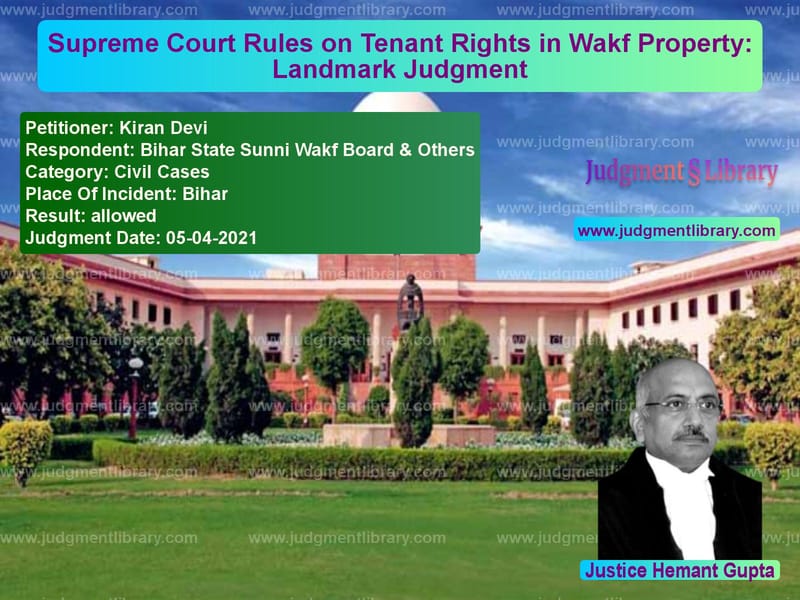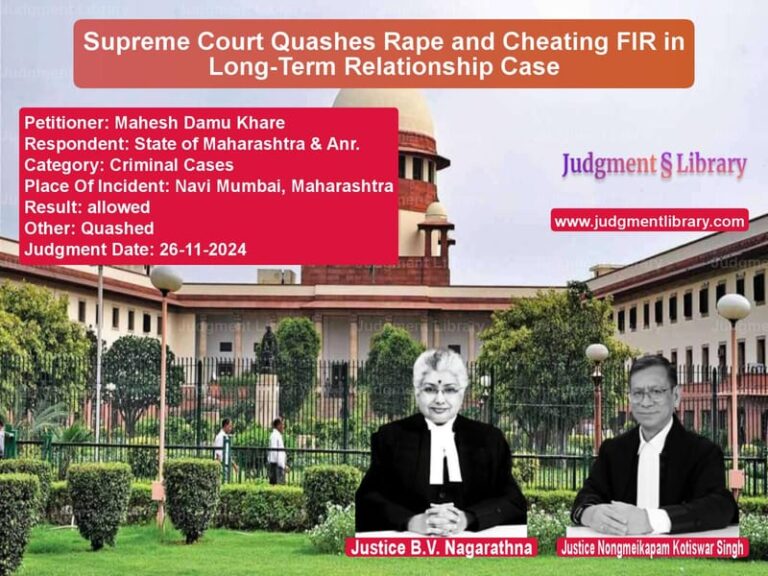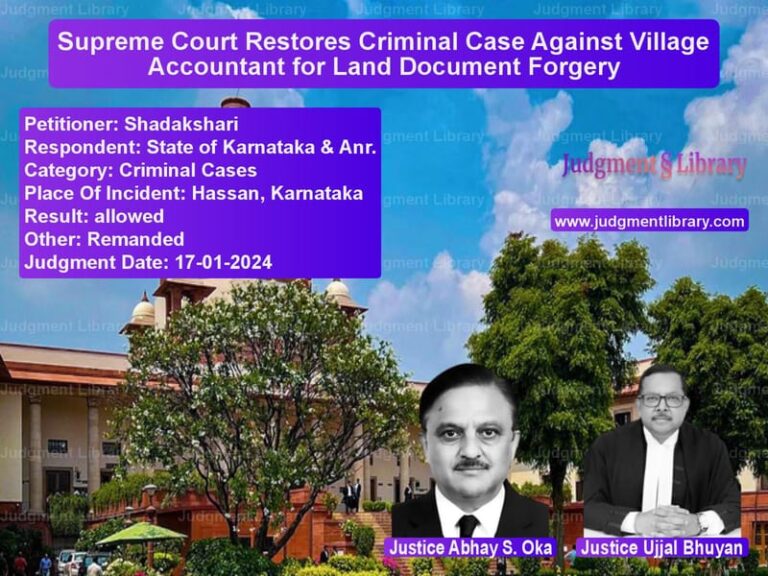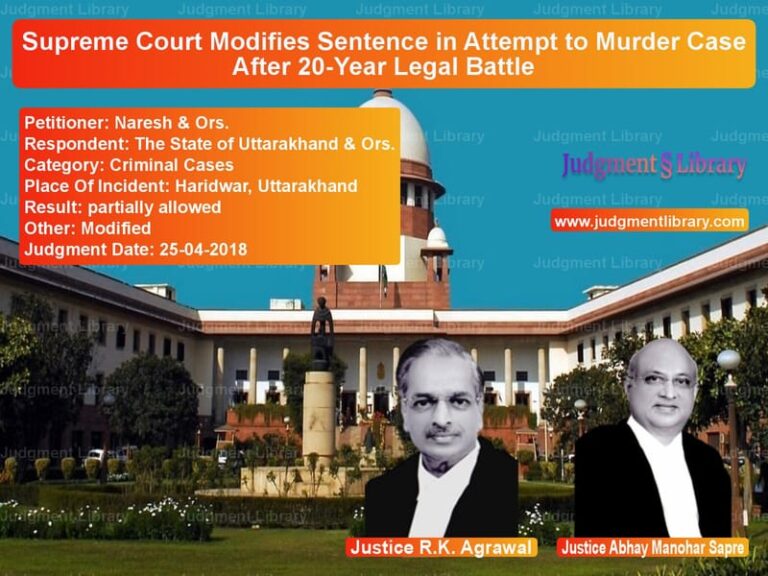Supreme Court Rules on Tenant Rights in Wakf Property: Landmark Judgment
The Supreme Court of India, in the case of Kiran Devi v. Bihar State Sunni Wakf Board & Others, ruled on a dispute concerning tenancy rights in a Wakf property. The case centered on whether a Karta (head) of a Hindu Joint Family could unilaterally surrender tenancy rights and whether such surrender was legally valid in the absence of consent from other family members.
Background of the Case
The case originated from a property dispute over a shop leased by the Bihar State Sunni Wakf Board. The dispute revolved around the tenancy rights of a family that had been running a hotel business in the Wakf property for several decades. The appellant, Kiran Devi, had been inducted as a tenant by the Wakf Board, but her tenancy was challenged by the respondent, who claimed hereditary tenancy rights.
The respondent (plaintiff in the original suit) had filed a case seeking a declaration that he was the rightful tenant of the premises and that the surrender of tenancy by his grandfather in favor of the Wakf Board was illegal. The case was initially heard by the Wakf Tribunal, which ruled against the plaintiff. However, the Patna High Court overturned the Tribunal’s decision, leading to an appeal before the Supreme Court.
Key Issues Raised
- Was the Karta of the joint Hindu family competent to surrender tenancy rights without the consent of other coparceners?
- Was the surrender of tenancy legally valid, and did it confer the right to re-allot the shop to a new tenant?
- Could a tenancy in a Wakf property be considered joint Hindu family property under Hindu law?
- Was the decision of the High Court justified in overturning the ruling of the Wakf Tribunal?
Arguments by the Appellant (Kiran Devi)
- “The tenancy was not a joint Hindu family property but an individual contractual agreement between the Wakf Board and the original tenant.”
- “The Karta had the authority to surrender tenancy rights, especially when the property was no longer in use for business.”
- “The High Court overstepped its jurisdiction by overturning the findings of the Wakf Tribunal.”
Arguments by the Respondent (Plaintiff)
- “The tenancy was inherited as part of a joint Hindu family business, and the Karta could not unilaterally surrender the tenancy.”
- “The surrender of tenancy was collusive and fraudulent, aimed at wrongfully evicting the rightful heirs.”
- “The tenancy should have remained with the family and could not be arbitrarily transferred by the Wakf Board.”
Supreme Court’s Observations and Ruling
The Supreme Court analyzed the legal principles governing tenancy, joint Hindu family property, and Wakf Board regulations. The key observations were:
1. Tenancy and Joint Hindu Family Property
- “A tenancy right, unless explicitly stated to be joint family property, remains an individual contract between the tenant and the landlord.”
- “Mere payment of rent by multiple family members does not establish tenancy as joint family property.”
2. Authority of Karta to Surrender Tenancy
- “A Karta has the authority to manage joint family affairs, including surrendering tenancy, provided it is done in the family’s best interest.”
- “Since the business had ceased operations for years, the surrender of tenancy was in the family’s best interest.”
3. Jurisdiction of the High Court
- “The High Court erred in overturning the Wakf Tribunal’s decision, as the Tribunal had the jurisdiction to decide tenancy matters in Wakf properties.”
- “A writ petition under Article 226 or 227 of the Constitution cannot substitute the statutory appeal process provided under the Wakf Act.”
4. Legal Validity of Surrender
- “The surrender of tenancy was legally valid as it was executed voluntarily and accepted by the Wakf Board.”
- “There was no evidence of coercion or fraud in the surrender process.”
Supreme Court’s Judgment
The Supreme Court ruled in favor of the appellant, setting aside the High Court’s decision and restoring the Wakf Tribunal’s ruling. The key directives were:
- The tenancy rights of the plaintiff were extinguished upon the valid surrender by his grandfather.
- The High Court’s order directing eviction of the appellant was quashed.
- The Wakf Board’s decision to induct the appellant as a tenant was upheld as legally valid.
- The case reaffirmed the legal principle that tenancy does not automatically become joint family property unless explicitly intended.
Key Takeaways from the Judgment
- Tenancy rights are individual contracts: Unless explicitly intended, a tenancy does not become joint Hindu family property.
- Karta’s authority is upheld: A Karta can make decisions regarding tenancy if it benefits the family.
- High Court’s intervention was unwarranted: The Supreme Court reaffirmed the jurisdiction of the Wakf Tribunal.
- Legally valid surrender: If a surrender is voluntary and accepted, it cannot be challenged later.
Conclusion
The Supreme Court’s decision in Kiran Devi v. Bihar State Sunni Wakf Board is a landmark ruling clarifying the nature of tenancy rights in Wakf properties and reinforcing the authority of the Wakf Tribunal in such matters. It establishes that a tenancy is not automatically a joint Hindu family property and that a validly executed surrender cannot be reversed based on retrospective claims.
Petitioner Name: Kiran Devi.Respondent Name: Bihar State Sunni Wakf Board & Others.Judgment By: Justice Hemant Gupta.Place Of Incident: Bihar.Judgment Date: 05-04-2021.
Don’t miss out on the full details! Download the complete judgment in PDF format below and gain valuable insights instantly!
Download Judgment: kiran-devi-vs-bihar-state-sunni-wa-supreme-court-of-india-judgment-dated-05-04-2021.pdf
Directly Download Judgment: Directly download this Judgment
See all petitions in Landlord-Tenant Disputes
See all petitions in Property Disputes
See all petitions in Judgment by Hemant Gupta
See all petitions in allowed
See all petitions in supreme court of India judgments April 2021
See all petitions in 2021 judgments
See all posts in Civil Cases Category
See all allowed petitions in Civil Cases Category
See all Dismissed petitions in Civil Cases Category
See all partially allowed petitions in Civil Cases Category







